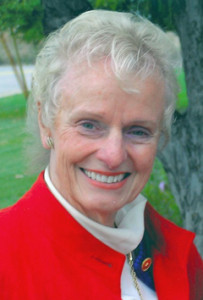By Celine Klosterman

DAVENPORT — Human trafficking is the fastest growing criminal industry in the world — and it’s happening in Iowa, former state Senator Maggie Tinsman told about 25 people March 29.
She focused on domestic minor sex trafficking during a presentation at Genesis Medical Center – West. Though her talk was geared toward helping healthcare workers learn to recognize and respond to potential human trafficking, about half the people in her audience were not in the medical field.
Tinsman, who drafted Iowa’s 2006 human trafficking law, showed a video clip from a report on Des Moines-based KDSM FOX 17 that told the story of sex trafficking survivor Brittany Phillips. As a 14-year-old runaway in the foster care system, Phillips found herself being sold for sex after accepting an invitation to a “modeling job” from a man at a Hy-Vee store in Cedar Rapids. He took her to Chicago and marketed her on craigslist.com’s adult services section, which the website later shut down in 2010 under public pressure. Phillips recalled how her captor beat fellow trafficking victims who threatened to call police or disobeyed him. After several months in captivity, she was arrested and sent back to Iowa after police determined she was a teenager, she said.
Youths such as Phillips who have been involved in Child Protective Services and have shown runaway behavior are more likely to fall victim to human traffickers, Tinsman said. Davenport police say a runaway teen girl won’t last 24 hours on the streets before being picked up, she added.
Other factors that leave teens vulnerable include a history of being abused, parental drug use and age.
Traffickers target potential victims at popular hangouts such as NorthPark Mall in Davenport, where they pursue girls who look nervous and alone and won’t make eye contact, Tinsman said.
Once captured, victims can develop what she called a trauma bond with their traffickers. Similar to Stockholm Syndrome, this bond occurs in the presence of danger, shame and exploitation. Brainwashed, a victim may start to believe her situation is normal, even her choice. She finds acceptance in the subculture of trafficking, and may be too ashamed to try to escape – if she could even find an opportunity to do so.
Two cases in which victims did find rescue resulted in convictions under Iowa’s anti-human trafficking law, Tinsman said. Men were convicted in 2008 and 2010 after forcing teen runaways into prostitution.
She said she planned to meet with local law enforcement later this month to discuss the need to further address human trafficking. She showed an advertisement picturing a young woman in the Quad Cities in the “escort” section of backpage.com, a classified-ad website similar to craigslist.com. Backpage.com brings in $20 million a year from escort ads, and the website’s owner Village Voice Media has refused to stop posting them despite public pressure, she said.
Tinsman suggested calling or emailing local chiefs of police to encourage them to consider doing “stings” in response to ads on backpage.com and to otherwise devote resources to combating human trafficking.
At the federal level, the Trafficking Victims Protection Act was passed in 2000 and comes up for reauthorization every three years. It is currently awaiting debate in the U.S. Senate, Tinsman said. She recommended people contact U.S. Senators Tom Harkin and Chuck Grassley of Iowa to urge them to bring the act to debate.
On his website, Sen. Grassley addresses the act in a message dated March 19. “Before we reauthorize the program, we need strong oversight provisions to ensure good use and accountability for the funding,” he wrote.
Tinsman’s presentation struck Elise Castro, a member of Our Lady of Victory Parish and sophomore at Central High School, both in Davenport. “It’s really scary to know that people our age have been involved in trafficking in our area,” she said. She attended the talk with several fellow members of the student group Girls Learn International. “We will definitely do something at school” to educate people on sex trafficking, she said.
Jennifer Hildebrand, coordinator of the Health Ministry Nurse Program at Genesis, said she couldn’t help but think of teen and preteen girls at her parish of Our Lady of the River in LeClaire. For the sake of current and potential victims, she believes people need to be educated. “When most people hear the word ‘trafficking,’ they think of transportation.” But if everyone attending Tinsman’s presentation did something to spread the word, they would make an impact, Hildebrand said.
“Each of the Faith Community Nurses who were present at this program represents a congregation and can spread the word on this growing crime. We have all been called — many hands lighten the load!”
The Diocese of Davenport’s Justice and Peace Advocacy Team is addressing human trafficking. To get involved or learn more, call the diocesan social action office at (563) 324-1911.
More information about human trafficking is at www.polarisproject.org.







